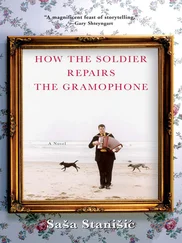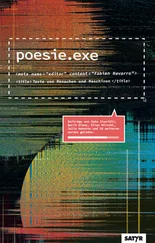We do feel a little historical surprise about that ox.
We take an interest in the fact that both documents are dated from the time before 1740 and the Great Fire. So they were preserved from the flames by a small miracle, and remained undiscovered until recently by a larger miracle.
We take an interest in the tooth of time. The tooth of time is not sharp in the cellar of the Homeland House. The document about the shepherd appointed by the rural district council shows no signs whatsoever of age; it is immaculate. Like all the other documents exhibited to date.
Now that, too, is interesting.
We are more inclined to believe our reason, which tells us that those documents are remarkably clumsy forgeries, than to believe Frau Schwermuth, who says that the device for regulating humidity in the atmosphere is super and top-notch. The archivist says nothing to explain how the documents managed to stay in such good condition before the acquisition of the device.
Johanna Schwermuth interests us enormously in terms of human and criminal history.
EARLY IN THE YEAR OF OUR LORD 1607, THE remarkable Discovery of a great Quantity of Pippins in the fallow Field on Geher’s Farm led to a Disputation concerning the rightful Owner of the said Fruits, and in Consequence the Ownership of the entire Field. Four Men had stated their Entitlement, three of them submitting documentary Evidence, to wit a signed Agreement, in proof of their rightful Claim to have leased that same Field. The fourth, his Honor the high-born Poppo von Blankenburg, had no Document to show, notwithstanding which he challeng’d the others in a loud, insistent Manner to a Bout of Fisticuffs, in order to decide upon the Matter — namely, to the Effect that he who was the Last left standing be declar’d Owner of the Apples.
Not three Days after that Challenge, the Mayor, a bankrupt Schoolmaster, determin’d, albeit amidst great Indignation and Protestations, that the Fist-Fight be deem’d a proper Method of reaching a Verdict.
Poppo von Blankenburg struck down All concern’d, including the Mayor, and was ajudged to have Carried the Day. That same Evening he wax’d roaring Drunk, ran out into the Field intending to Embrace the same, fell, struck his Head upon a Rock, and expire’d of that Injury.
Therefore the fallow Field laps’d into the Wilderness of its unknown Origin again, in which Condition it bringeth forth Wasps, and Coneys, and wild Roses Year after Year, only to engulf and consume them once again.
MY MA WEIGHS TWICE AS MUCH AS MY PA. SHE weighs 130 kilos. In spring she puts on another 30 kilos of weighty thoughts (worries, fears, shame and general listlessness). Then my 160-kilo Ma lies down among the daffodils in the garden, because when she is lying down the dark clouds are about 160 centimeters farther away. Her eyes are closed, and we’re supposed to leave her alone. There’s nothing any of us can do about that, as a husband or a son or a daffodil. It’s impossible to get my 160-kilo Ma back on her feet if she doesn’t want to stand on them, it’s impossible to get her to cheer up if she doesn’t feel like it.
If it gets colder in the evening we cover her up. We sit with her. In fact it’s almost nice for all the family to be doing something together. Pa is busy with DIY of some kind, I’m preparing for our next role-play meeting (I’m going to be a thieving half-elf, good at fencing and flight). Demographically, my hobbies ought to be first-person shooter games and right-minded ideas, but neither of those is as cool as the role-playing.
Sometimes I lie down beside Ma and read her old stories from hereabouts. She likes those. The one she likes best is the story of Jochim the invisible tinker. Ma’s mouth twists. Maybe she’s smiling. Or maybe she’d like to be invisible.
I’ve never known Ma to be any different in spring. My 65-kilo Pa and I and Dr Röhner in Prenzlau don’t kid ourselves. Ma is not okay. She knows it herself. It’s in her nature, she says, and there’s nothing you can do about your nature.
There’s a lot of gossip about Ma, but people will gossip about everyone. They praise Ma a lot too. Most of all they praise her for working so hard at everything to do with the Homeland House. Ma runs the Homeland House because she has real ideas about it. Ma has a better idea of the village than anyone else. She’s not interested in the country round the village. If the tourists ask her about it she just points to the brochures on display in the Homeland House, or to Frau Schober who sits around there and has family in the area, but Frau Schober is usually sitting around in the Homeland House because she’s old, and her family never come to visit, and she’d be bored to death on her own, so it’s teamwork between Ma and Frau Schober.
Ma also belongs to the History Society. They meet twice a week, sometimes Ma doesn’t come home until the morning after a meeting. I haven’t the faintest what goes on. A few old folk who like each other and like history too, sitting together jabbering away, that’s how I imagine it. After a while someone says, “Right, let’s talk about witch-burnings today. How do we feel about that? Anyone like to say something? Johanna? Yes, go ahead.”
They’re responsible for Our Fürstenfelde , too. That’s kind of a magazine full of old folks’ memories. The old folk are always complaining that no one’s interested in their memories. Our Fürstenfelde shows you how wrong they are.
Ma always writes something for it. The latest edition is subtitled “The Fire Brigade and Other Associations.” Ma has two pieces in it, one about the church choir, she didn’t sing well enough to join it herself but Ma’s not one to bear a grudge, and one about our fires. It starts like this: “Fürstenfelde isn’t a bad place for fires.” Great opening, Ma. It’s a fact that there have always been fires in Fürstenfelde. That’s a tragedy for Ma. Not because of the victims but because so many books and stuff like that get burnt. Old books mean to Ma what the bells mean to me. Her fingers sometimes smell like the last century when she comes back from the Homeland House (it’s all that yellowed paper).
For instance, Ma found out that Fürstenfelde was once a town, only the right to a town charter got drunk away so now Fürstenfelde is only a village. And she knows all the old folk tales about this place. Better not ask her to tell them: she tells them so as they’re really frightening, does different voices, body language, all that. The kids either love it or run away.
This is what I think: I think Ma uses the past to take her mind off the present. I mean off her body and her worries. Including in spring. In spring she lies there whispering stuff from the folk tales to herself. Sometimes it sounds like there’s someone answering her. I like that. I like anything that cheers Ma up a bit in spring.
Ma swallows vitamin pills, avoids eating fatty food, goes for a bike ride every day, but it makes no difference, she’s very fat and she sweats and gasps for breath. I can see how difficult going to the loo is for her. And how badly she suffers from the heat of summer and her own body. She complains of it, naturally she complains of it. And I think it’s disgusting too, of course, but I’d flip my lid if anyone said anything nasty about Ma.
Ma is organizing an anti-Fascist bike ride for the Feast. People wanted a long route going right out of the village: Fürstenfelde — Wrechen — Parmen — back to Fürstenfelde. Ma said: “Thälmann-Strasse — Berlinerstrasse — Mühlenstrasse — the barn by the wall — Thälmann-Strasse. I’m organizing it, so I say where the route goes.”
Ma doesn’t much like going away from here. I guess that’s because she feels okay in Fürstenfelde. Everything’s always the same, or if it changes, it changes very slowly. The lake is shallow close to the banks, the depths lie in wait farther out. Ma gets nervous when things aren’t just as she expects. At home she always chooses the same route. She could go straight into the kitchen from the living room, but she takes the long way round down the corridor. She has her sofa and her chair. Visitors have to say in advance that they’re coming. You might think all those new tourists turning up in the Homeland House would bother her, but the differences between them are too small for that: some wear North Face jackets, some wear Jack Wolfskin jackets. Some want to know if there really isn’t a restaurant around here open on a Monday (yes, there is, but you have to go to Feldberg), others want to use the toilet (down the corridor, door to the right of the TV set). That’s all the difference there is to it.
Читать дальше












